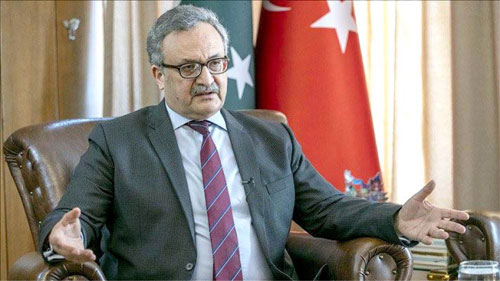Pakistan will be hosting the 48th session of the Organization of Islamic Cooperation (OIC) Council of Foreign Ministers on March 22-23 to further discuss topics on Islamophobia, Afghanistan, Kashmir and Palestine, according to Pakistan’s ambassador to Turkiye.
Muhammad Syrus Sajjad Qazi told Anadolu Agency in an interview that this year’s session also coincides with the Pakistan Day parade, where the OIC foreign ministers will be guests at the event as well. “In 1940, the All-India Muslim League met in Lahore and decided that the Muslims of South Asia deserved and wanted an independent homeland of their own. Seven years later on Aug. 14, 1947, Pakistan came into being as a result of the resolutions adopted in 1940 on March 23,” Qazi said.
Regarding the meeting’s agenda, Qazi said it will encompass everything that is of interest to the Muslim world, with this year’s theme “Partnership for unity, justice and development.” “But specifically, Palestine will be discussed, Kashmir, and other important issues for our various member states. Islamophobia, the trend of hate speech against Muslims, negative stereotyping of Muslims, and the situation in Afghanistan and its humanitarian dimension will be discussed,” he said. Qazi recalled the extraordinary session of the OIC held in Pakistan in December 2021, which exclusively focused on the situation in Afghanistan and helping its citizens with the economic and humanitarian challenges they were confronting.
“The situation in Afghanistan will be discussed. In fact, we will look at one of the conclusions of the December extraordinary session to establish a trust fund. We hope to be able to operationalise this trust fund at this coming meeting, so Afghanistan will be a very significant part of the extensive agenda of the meeting. Our main focus is to help our Afghan brothers and sisters overcome the humanitarian challenges,” he said.
“The event will highlight the unity of the Muslim ummah in the face of very serious challenges facing the world. We will also be looking at a productive session. We expect to be adopting about 100 or so resolutions on various teams. It will be an important venue to give voice to the Muslim countries and their causes.” ‘OIC is being criticised’
“Imagine if the OIC was not speaking on the Palestinian and Kashmiri issues. One would see that the picture immediately changes. So sometimes unfortunately the OIC comes in for a bit of criticism on account of its perceived inability to solve various problems,” Qazi said.
He said the problems of the OIC were very serious and complicated and that the media does not reflect on the events in these regions. “But most importantly, what the OIC does is to lend a voice to these issues and to keep them alive, to highlight them, to inform the world to look at these issues. So the OIC allows the individual voices of Muslim countries to be heard in the collective,” he said.Qazi emphasised that the OIC in these issues comes up with solid resolutions but that there was a wider international community also that needs to take up its responsibility and speak up like the OIC on these issues. “When this happens, these issues will come closer to a resolution,” he said.
Pakistan has previously hosted four sessions of the OIC Council of Foreign Ministers. It is the second-largest intergovernmental organisation in the world after the UN, with 57 Muslim member states spread across four continents. Foreign Minister Shah Mahmood Qureshi confirmed that the top diplomats of 46 Islamic countries will be attending the meeting.—Agencies









